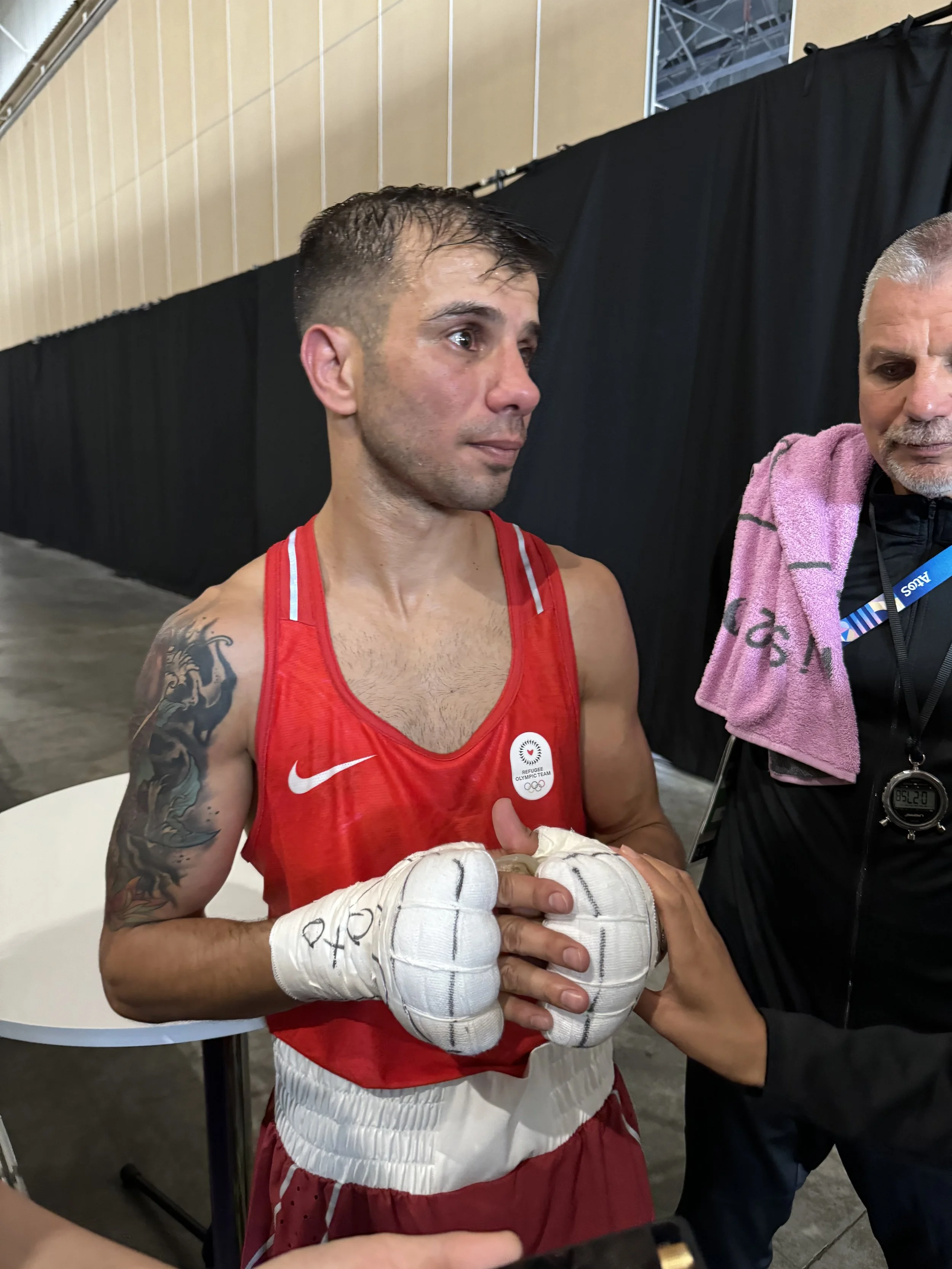PARIS – In the blue corner, representing the United States, from Spring, Texas, ladies and gentlemen, Roscoe Hill, dancing with orange shoes, baptized – why should you believe it because everything in boxing is 100% true but this really is – by George Foreman himself.
In the red corner, in lime-green shoes, representing the Refugee Olympic Team, Omid Ahmadisafa, a product of the Islamic Republic of Iran, a world champion in 2017 in kickboxing – not boxing, kickboxing – who three years later, while competing in Italy, sought asylum was invited to train with the German national team in Cologne.
And here we were, the rain having finally cleared outside, the stands maybe half full, perhaps 25 reporters from around the world here inside Arena Paris Nord, to take in this first-round men’s under 51-kilogram fight.
You couldn’t make it up if you tried. Script this, fight club, if you dare.
If the first rule of fight club is that there is no fight club, the first rule of Sunday’s matchup was something entirely different.
But first:
The victor – Roscoe Hill, on points, all five judges declaring he was Sunday’s winner.
Roscoe Hill, left, squaring up Sunday against Omid Ahmadisafa in first-round flyweight action
“My skills are too good,” he said afterward with a big smile.
Ahmadisafa fought to hold back tears.
“I am upset,” he said through a translator. “For all the people who expected I would win. I am upset for them and disappointed.
“Because I had a lot of hope.”
Boxing dwells in hope.
Around the world, boxing is what sociologists might call a “social lifter.” You don’t need much of anything to get into the gym and get after it. It’s why it has universal appeal.
The sport also has, as is well known, a rich Olympic history, especially in the United States – the likes of Cassius Clay (who would later be known the world over as Muhammad Ali), Foreman, Sugar Ray Leonard, Oscar de la Hoya and more.
All the same, it is during these years not exactly the International Olympic Committee’s favorite sport on the sprawling program.
A complicated political fight has seen the International Boxing Association, controlled by the Russian Umar Kremlev, expelled. A rival, World Boxing, is seeking legitimacy. Whether it gets there by 2028 and Los Angeles is uncertain.
Meantime, as the IOC has made plain – just as it did in Tokyo three years ago – the boxing itself will go on at the Games.
Hill is the 2021 world silver medalist in this class — Americans in particular would call it flyweight — when the governing federation was known as AIBA.
He grew up in the Foreman gym.
Foreman baptized him, Hill said Sunday, when he – Hill – was 13.
“I had got baptized before but I was, like, I hope Jesus Christ don’t punish me for getting baptized twice,” he said.
As is well known, Foreman has engaged in a multiplicity of endeavors post-active boxing career. Running that gym. Father of sons all named George. Competitor in one of the seasons of Masked Singer. And, of course, hugely successful grill salesman.
“He didn’t give me no grill,” Hill said, meaning as a baptism present.
He said a moment later with a big smile, “We already had one.”
Hill, now 29, came to Sunday’s fight with something of a challenge. His family was not here. The only people changing “U-S-A!” in the stands: a smattering of American officials up in a far corner. “I was supposed to go on the 30th,” he asserted, meaning his first fight, adding about his family, “They’re on the plane right now.”
Then again, he had a plan for what to do when he got in the ring. He learned it, he said, in part from George.
The Hill style is to keep the left hand low and go with the jab, then go for the kill – he just missed with an uppercut with 30 seconds left in the third and final round – when the opportunity presents.
“The most important thing is the jab,” he said.
“You never know what I may do,” he said. “I may move. I may get out of the way. He may go down. You never know. So, it keeps my opponent thinking at all times.”
An undercurrent to the fight, even though Ahmadisafa was here representing the Refugee Team: both fighters knew full well he hailed from Iran.
“I think about it,” Hill said.
“But the main thing I think about is my skills.”
Ahmadisafa, coach by his side, struggling afterward to hold back tears
Ahmadisafa, 31, said he had prepared, hard, for two years for this moment.
In all, 10 tournaments.
“I felt I was ready,” he said, “to win.”
He said he felt a mixture of both happiness – at achieving his dream of competing at an Olympics – but sadness, too.
“For sure,” he said, “I wanted to win.”
And then, of course – in the first round, fighting, what with the randomness of the draw and life, an American.
A translator, speaking Farsi, paused to make sure it was OK to ask Ahmadisafa the question pressed by a particular American journalist about how this came to be.
About this particular dynamic.
And its geopolitical ramifications.
It was OK, she was told.
He offered the first, and most enduring, rule of the Games. The reason the Olympics, for all their problems, matter.
“We are all from different countries,” Omid Ahmadisafa said. “We are friends.”



